Facts and secrets of sea sponges.
Introduction
Ocean Sea sponges, belonging to the phylum Porifera, are ancient and enigmatic inhabitants of the ocean. Despite their simple structure, they play crucial roles in marine ecosystems and possess intriguing characteristics and secrets.
Evolutionary Marvels
Sea sponges are among the oldest living groups of animals, with a lineage tracing back over 600 million years. They have witnessed the rise and fall of countless species, adapting and surviving through dramatic changes in Earth’s history.
Biological Simplicity
Remarkably, sea sponges lack true tissues and organs. Their porous bodies rely on a network of channels called ostia to circulate water, which brings in oxygen and nutrients while expelling waste. This simplicity belies their essential role in maintaining ocean health.
Regenerative Abilities
Sea sponges have extraordinary regenerative capabilities. They can regrow from small fragments, a feature that aids both survival and asexual reproduction. In some species, even if the cells are separated, they can reassemble into a functioning organism.
Chemical Factories
Sponges produce a vast array of bioactive compounds, which serve as defenses against predators and infections. These chemicals have significant pharmaceutical potential. For example, Discodermia dissoluta produces discodermolide, a promising anti-cancer compound.
Symbiotic Relationships
Many sponges host symbiotic microorganisms, including bacteria and algae, within their tissues. These symbionts provide nutrients through processes like photosynthesis, enabling sponges to thrive in nutrient-poor environments. This mutualistic relationship enhances the sponge’s adaptability and survival.
Environmental Indicators
Due to their sensitivity to environmental changes, sea sponges are valuable indicators of marine health. They can accumulate pollutants, making them useful for monitoring oceanic contaminants like heavy metals.
Secret Communication
Recent studies reveal that sea sponges can communicate chemically. When damaged, they release signals that alert neighboring sponges to potential threats. This form of communication, though not yet fully understood, suggests a higher level of complexity in these organisms.
Hidden Diversity
The diversity of sea sponges is astounding, with over 8,500 described species and many more yet to be discovered. They inhabit various environments, from shallow coastal waters to the deep sea, where they form extensive sponge grounds.
Sea sponges in the sea, with their ancient lineage and unique biological traits, continue to fascinate scientists and marine enthusiasts. Their ecological roles, regenerative abilities, production of bioactive compounds, and symbiotic relationships underscore their importance in the marine world. As research delves deeper into their mysteries, sea sponges may unveil further secrets, offering insights into marine biology and potential benefits for human health.

Mark Thompson, a seasoned pest controller, is renowned for his expertise in keeping homes and businesses free from unwanted intruders. With a passion for environmental sustainability and a deep understanding of pest behavior, Mark has become a trusted authority in the industry.
